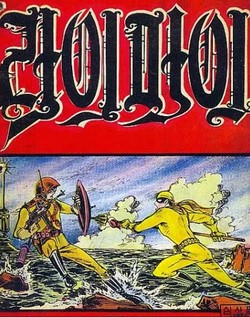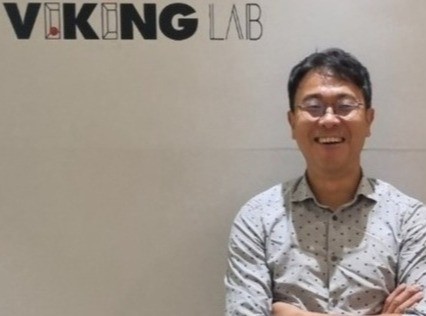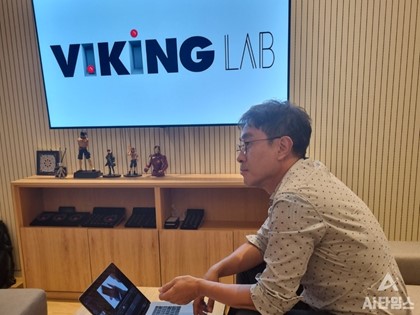The comic Life Pi by artist Kim San-ho, published between 1959 and 1962, is Korea's first science fiction (SF) hero series. At a time when the concept of SF itself was unfamiliar, the story of a hero flying through the sky with a rocket pack on his back and a headscarf marked with the letter "ㄹ" to defeat villains captured the imagination of the era and gained tremendous popularity.

"Life Pi" by artist Kim San-ho
Today, only a handful of people have actually seen the work. Some argue that if it were modernized and reintroduced, it would succeed not only in Korea—where SF hero content is rare—but also overseas.
But what if this work could be restored through artificial intelligence (AI) technology?
Viking Lab (CEO Kim Dong-kyu) has taken on this challenge. "We have reached an agreement with artist Kim San-ho and begun work on remaking Life Pi," said CEO Kim. "We are currently working on releasing it in the form of a webtoon."
Kim San-ho is now 83 years old, making it unrealistic for him to restart the work himself. This is where artificial intelligence (AI) technology comes into play.
Viking Lab is a research corporation formed by experts in 3D, VFX (Visual Effects), and ICVFX (In-Camera Visual Effects), founded last year to create metaverse content based on AI-driven visual effects.
In particular, CEO Kim Dong-kyu is one of the top experts in the field, having spent the past 20 years building special effects devices and workflows. He has played a leading role in introducing special effects into Korea.
He also stated that remake projects using AI will expand beyond Life Pi. The ultimate goal is the globalization of K-content.
There are many legendary dramas and films that, if released today, would be immensely popular both domestically and abroad," he said. "However, most require restoration due to deterioration in image quality, making AI an effective tool for the task."
He further emphasized, "By riding the current global wave of interest in K-content and distributing such works worldwide, we too can become a nation that holds world-class intellectual property."

Kim Dong-kyu, CEO of Viking Lab, posing in front of the office
In fact, Viking Lab is also participating in a joint research project to develop an "AI-based video content remastering and editing platform."
This initiative is a research and development project designated by the Ministry of Culture, Sports and Tourism and the Korea Creative Content Agency. It aims to localize video industries—such as film, drama, comics, performing arts videos, and intangible cultural heritage restoration—that have relied heavily on foreign technology. The goal is to release a domestically developed video content remastering and editing platform.
KBS and MBC C&I are also participating. Until the early 2000s, most video content was introduced through terrestrial TV, and broadcasting stations have accumulated vast archives of material over decades.
Restoring old footage is a time-consuming and costly process. In particular, existing video equipment is entirely dependent on imports. There is hardly any need to explain why AI technology is essential.
CEO Kim's decision to embark on a project to restore representative K-content was sparked by his encounter with artist Kim San-ho. Discovering Life Pi at the artist's home, he said, "I was stunned that such a work could have been created at that time, and I felt a sense of mission to revive it and share it with the world once again."
Even broadcasters that have already built digital archives of video footage have high expectations for generative AI, as it enables new forms of remastering.
Kim's goal also goes beyond simple restoration. Building on the original work's outstanding artistry, he aims to create so-called "spin-offs" adapted to modern settings and sensibilities. For a comic like Life Pi, this means not only reviving the original as a webtoon but also restructuring the storyline to produce an animated series.
These works could then be distributed globally through video platforms like YouTube or OTT services such as Netflix. Given the current global interest in K-content, it is clear what kind of impact a remake of a once immensely popular title could achieve—potentially even surpassing Squid Game.
Kim noted that there are many past works worthy of such treatment. Time, however, is of the essence—if too much passes, it may become impossible to even contact some of the copyright holders.
He cited Hollywood and Japan as examples. Icons like Superman and Batman have endured through decades of continuous spin-offs, while Japan also offers numerous similar cases.
AI technology is the key to drastically reducing production time and cost while perfectly reviving originality in both spin-off creation and original restoration. Viking Lab is also in talks to collaborate with top domestic technology companies such as Dexter Studios and Xon Studio.
However, Kim pointed out that something is just as important as technology: governance.
He recalled participating in the much-discussed digital human project for the late Kim Sung-je last year, saying it raised serious questions about whether reviving the deceased is truly right. "Acquiring the digital IP of an individual is not simply about portrait rights or appearance contracts. With just a single photo, an enormous amount of content can be generated, yet in many cases the individuals themselves—or their families—are unaware of these implications," he explained.
He noted that most copyright holders of works subject to remastering are elderly. Future challenges must be considered within the complex relationships among copyright holders, production companies, distributors, and even the families of rights holders.

Kim Dong-kyu, CEO of Viking Lab
Viking Lab plans to first focus on restoring Life Pi, and then expand into other areas. Beyond comics, the company intends to revive a variety of "legendary content" such as dramas and music using the remastering platform.
Finally, Kim expressed hope that many more people would join the field. His request was not for others to join his own business, but for anyone with interest in K-content remakes to participate and enter the industry.
"This is a field where anyone can contribute ideas. I hope that other entrepreneurs, not just myself, will take an interest and join in globalizing Korean content," he said.
These were the candid sentiments of CEO Kim, who has loved content and worked in the field for decades.